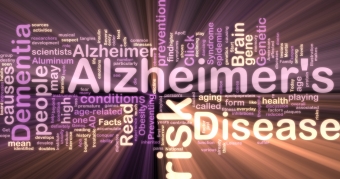ALZHEIMER'S TREATMENT: NEW ADVANCES
Alzheimer Treatment: New Advances
On Aug. 8 a report published in Alzheimer's & Dementia: The Journal of the Alzheimer's Association. Researchers reported they have discovered a link between three degenerative eye diseases and Alzheimer's disease.
Their findings may eventually lead to new ways to identify people at high risk for Alzheimer's.
The study does not mean people with these eye conditions will get Alzheimer's disease," the finding maybe a new development in determining risk for developing the disease.
"The main message from this study is that ophthalmologists should be more aware of the risks of developing dementia for people with these eye conditions and primary care doctors seeing patients with these eye conditions might be more careful on checking on possible dementia or memory loss," Lee explained in a university news release. Early detection can lead to earlier treatments which may forestall some of the advances of dementia symptoms. Families should also be aware of these conditions so they can alert their family doctors of changes in their loved one’s condition
The study although rather small involved 3,877 randomly selected patients, aged 65 and older. They were tracked over the course of five years, during which time 792 were diagnosed with Alzheimer's disease.
Patients with age-related macular degeneration, diabetic retinopathy or glaucoma had a 40 to 50 percent greater risk of developing Alzheimer's disease than those without the eye conditions, the researchers said.
"What we found was not subtle," said Paul Crane, a professor of medicine at the university. "This study solidifies that there are mechanistic things we can learn from the brain by looking at the eye."*
Living with Dementia and Alzheimer’s disease
If you suspect a loved one is showing signs of dementia and Alzheimer's, seek medical care immediately. Getting an early diagnosis of dementia and Alzheimer’s will come as a shock, no doubt, but early detection offers treatments for dementia that can help your loved one maintain optimal functioning. Even if you have been half expecting a dementia diagnosis, it will come as a blow. Getting support and reassurance will help with the initial upset. However, there is much that you can do in the early stages of Alzheimer’s and Dementia that will help make life easier and more enjoyable - now and in the future.
Sadly, as the disease progresses a lot of sufferers will require care in a memory care facility or group home as the level of care continues to increase the more the disease progresses. When it becomes necessary to have your loved one reside in a memory care facility or group home they will get all the assistance they need which will allow you to go back to being their spouse or adult child instead of their caregiver which becomes an all-consuming task.
Caregivers
The year 2015 saw people – family and friends – provide unpaid care to the cost of $221.3 billion for approximately 18.1 billion hours for Alzheimer’s and other dementia sufferers. The toll on caregivers is devastating as the emotional and physical demands of caring for a loved one 24 hours a day over an extended period of time are overwhelming.
Getting your loved one into an assisted living facility specially designed for seniors with Alzheimer’s, dementia or other forms of memory loss becomes inevitable.
Residents of Phoenix and the surrounding towns can always get their loved ones admitted into an assisted living facility – they are not in short supply but budget can dictate available options. Many families struggle with making the move as they feel it is their responsibility to provide for their loved one’s care but once they do they realize they should have made the decision much sooner so they receive the proper care and attention they deserved. Alzheimer’s is a serious health issue in Arizona and accounts for 60 to 80 percent of dementia cases. Care and treatment of Alzheimer’s patients in Arizona assisted living facilities is provided throughout the state in assisted living group homes, larger assisted living communities and memory care facilities.
Where to Get Help
Enlisting the support of healthcare professionals like the one at A Caring Hand for Mom (and Dad) can be a life saver. They are licensed healthcare professionals and can help guide you in understanding the available options, the costs and differences between facilities and group homes in your area. Contact A Caring Hand for Mom today by calling 800-881-7706 and speak with a healthcare professional. There is no charge for our services to our clients so don’t hesitate to contact us.
* The U.S. National Institute on Aging has more about Alzheimer's disease.
SOURCE: University of Washington, news release, Aug. 8, 2018
Related Posts
Comments
By accepting you will be accessing a service provided by a third-party external to https://www.acaringhandformom.com/




